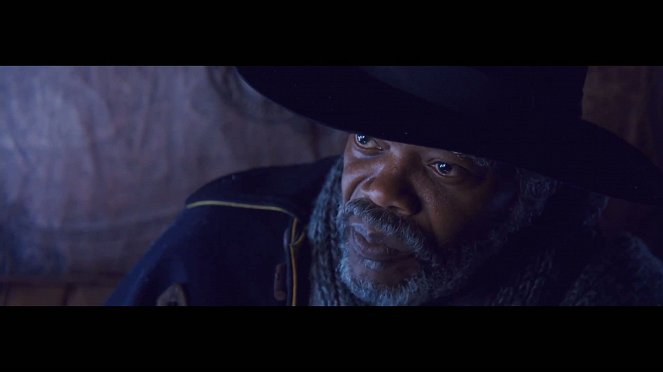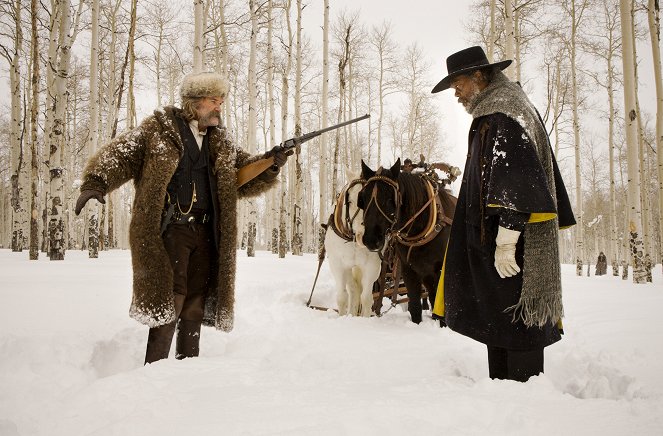Directed by:
Quentin TarantinoScreenplay:
Quentin TarantinoCinematography:
Robert RichardsonComposer:
Ennio MorriconeCast:
Samuel L. Jackson, Kurt Russell, Jennifer Jason Leigh, Walton Goggins, Demián Bichir, Tim Roth, Michael Madsen, Bruce Dern, James Parks, Dana Gourrier (more)VOD (3)
Plots(1)
Set after the American Civil War, the film follows bounty hunter John 'The Hangman' Ruth (Kurt Russell) as he takes shelter in a remote stagecoach stopover with his captive prisoner Daisy Domergue (Jennifer Jason Leigh). On his way there, Ruth meets ex-Union soldier and fellow bounty hunter Major Marquis Warren (Samuel L. Jackson) and Chris Mannix (Walton Goggins), a man who claims to be the sheriff. When the newly-formed group arrive at the cabin an assortment of other unfamiliar and unsavoury characters awaits them. (Entertainment in Video)
(more)Videos (28)
Reviews (16)
The Hateful Eight get off to a weaker and quite long start, but then becomes a hardcore Tarantino movie par excellence. A clever theatre play with audience expectations and reminiscent of both Reservoir Dogs and Carpenter’s The Thing in western guise (the movie adopted three distinctive soundtrack pieces, an isolated frosty winter environment, the scene of finding the culprit in the characters’ own ranks…). Also, thanks to the sinister music by Morricone, this is the darkest, most hateful Tarantino movie, more hateful than the hateful Reservoir Dogs. Samuel L. Jackson, who revives some of the traits of his most iconic character, Jules Winnfield, is probably the coolest actor of today. His black dick story is just topnotch. Quentin knows he can do whatever he wants and we will always fall for it!
()
The Hateful Eight is a great Tarantino revival and, after a long time, a film for which I would not regret paying a higher ticket price (though I’d still rather pay more for a screening from a 70 mm print). Faces familiar from Tarantino’s previous films, a return to the intimate “whodunit” concept of Reservoir Dogs (despite the epic establishing shots and imaginative use of spatial partitioning, which best stand out on the big screen), references to its own universe (Red Apple tobacco), division into chapters (which, in addition to rhythmising the narrative, serve to reveal new information and redirect the viewer’s expectations), the non-chronological organisation of the narrative (which doesn’t break up the film, but contributes to its overall integrity), visual and motif references to spaghetti westerns (Jackson stylised as Lee Van Cleef) and John Ford’s westerns, as well as to (slapstick) splatter flicks and Carpenter’s The Thing, variations on narrative formulas from blaxpoitation and samurai films, not individual scenes but almost the whole film based on waiting (ours and the characters’) for something to happen (and when something finally does happen, there is – in the roadshow version – an intermission followed by a flashback with Godard-esque commentary) and whether it turns out at the end that some of the characters were connected to each other by something other than a chain. The constant delaying of action and the use of dialogue to draw out scenes of simple actions, which the aforementioned Godard enjoyed using to test the patience of his viewers (see the magnificently retarded scene from Breathless with Belmondo and Seberg blabbering in a hotel room) make The Hateful Eight a unique film not only in the context of contemporary Hollywood production, which offers viewer satisfaction much more quickly, but also in Tarantino’s filmography. The first half of the film is not just a sadistically long prelude. The director uses various delaying tactics from beginning to end and even lets the characters provocatively point that out (“Let’s slow it down”). Regardless of the large number of identified (self-)references, this is a masterfully written and acted film in which everything elegantly clicks into place in the end; it just intentionally takes longer than would have been necessary, which would seemingly work as well only as a stage play (the film is aware of its theatrical structure and thematises it with gusto). Most of the characters play a certain role and the film derives much of its tension from the characters/viewers not knowing who is pulling which end of the rope. Though basically everyone is a lying bastard (those who aren’t won’t survive long), your sympathies will constantly shift from one character to the next depending on what Tarantino reveals about them. As much as to the detailed distribution of power (consisting not only in who has a loaded gun in their hand, but also in who knows what – see all of Chapter Four), the film owes its dynamism to the fast-paced dialogue, the energetic acting and camera movements (drawing our attention to important motifs), the lighting, the refocusing, the work with the depth (height and width) of the space and the editing (taking into account who is looking at whom and how). Even more than Django Unchained, The Hateful Eight would like to be a political allegory in the style of the subversive counterculture westerns of the 1970s, using not very sensitive means to draw attention to the parallels between racism and capitalism. The literalness of the film’s ideological level (lines like “When niggers are scared, that’s when white folks are safe”, the division of the bar into individual American states) contrasts with the much more subtle means by which Tarantino builds tension, creates an oppressive atmosphere of distrust and communicates essential information about who is an ally or an enemy. Even so, this is a brilliant allegory that offers very disturbing and not entirely unambiguous commentary on a different interpretation of law and justice. Tarantino has made an extremely nihilistic western that successfully creates the atmosphere of an era in which people are united mainly by their hatred of a common enemy. Primarily, however, it abounds with the narrative skill of the best Agatha Christie novels. I believe that, like Christie’s books, The Hateful Eight will only get better over time. 90%
()
(less)
(more)
Even though Quentin Tarantino is not my cup of tea, I am always curious about his next movie. However, after the years I already know that he will surprise me with nothing else than the fact that he keeps roping one acting ace after another into his movies. That may be the reason why I still cannot miss single one of his movies. And The Hateful Eight again did not disappoint. If I wouldn’t blame the actors, whom I hold in high respects, I would blame the film itself, which incredibly overacts. The 182 minutes of footage really show Quentin’s big confidence as he thinks that I will fall for a film this long. The problem is that he stretched a good premise twice as long than this kind of film would deserve. For example, the first scene in the post chaise is incredibly deadening and boring, and nothing fundamental happens there. The film gets a really interesting touch only towards the ending, when something finally starts to happen. At the time you can expect basically anything because everybody playing in this movie has a character so absurd that the audience knows that anything can happen. Actors with their polished English from the American countryside create the impression that almost every line uttered in the movie is a catchphrase. And there is quite a lot of them. Tarantino again did not disappoint. However, it never ceases to fascinate me that his fans still buy everything he makes. Just switch the locations for the Second World War and you get Inglorious Basterds. Switch it for the America filled with gangsters and you get Pulp Fiction. Is this movie really that original as it pretends to be?
()
Extremely indulgent, long and self-absorbed Tarantino, who set the Reservoir Dogs back 150 years in time, doubled the running time and changed about 20 percent of the script and dialogue. I wouldn't have expected something so unoriginal given his previous work. Of course the traditional long dialogue passages licked to absurdity are great, as are the lead actors and the expected splatter finale, but there have been enough of those spaghetti westerns. Topping it off is Tim Roth, who tries in vain to do the exact same gestures and creations as Christoph Waltz, who was clearly not up to the task for this winter romp. Where is the inventiveness, originality and multi-themed homage to everything possible and impossible with a ton of ideas at every turn that was so evident in Kill Bill?
()
A self-indulgent massage of the creative ego, which has grown to manic proportions in the use of epic cinematic toys (Ennio, 70 mm, Nicoreto), all whilst covering itself for three hours with a banal story that commits obscure suicide in the form of the chapter "Earlier that morning," destroying the last vestiges of credibility. The much-maligned first hour is in no way useless, and the snow rascals couldn't have gotten better casting (all of them amazing, but Goggins' Mannix undergoes the most interesting evolution of audience sympathy). Thus, even if common sense starts to politely resist it after all the grand circles, Tarantino proves again how cheap of a whore the audience can be at times and gets hooked by banalities we'd long ago boo others for. If, in the end, you accept the fact that the absence of Quentin's traditional absurdist humor is actually a good thing, you're going to like the film. 4 ½.
()


